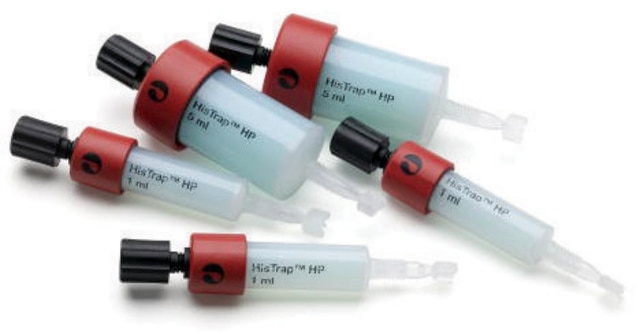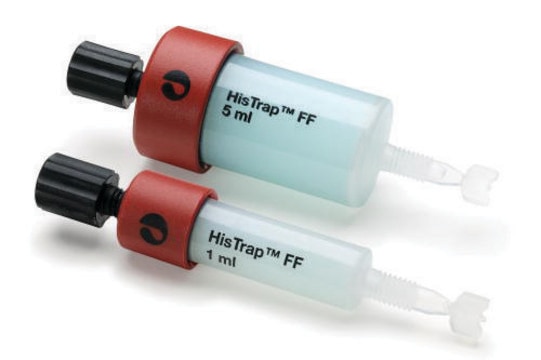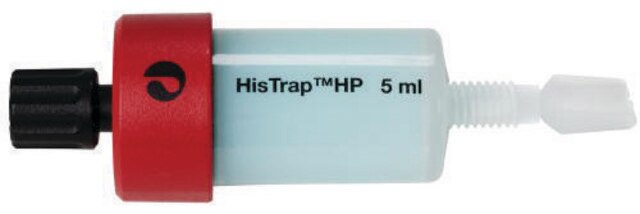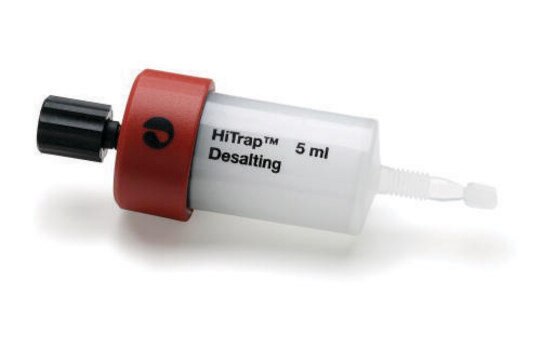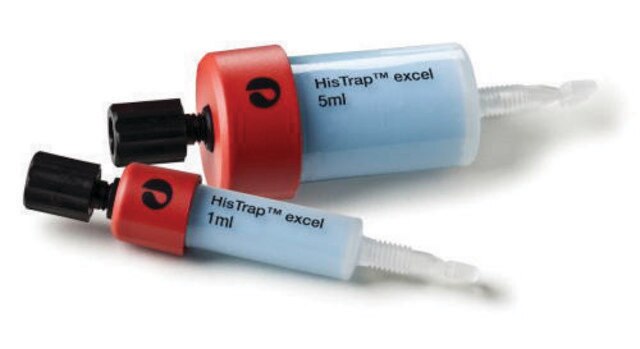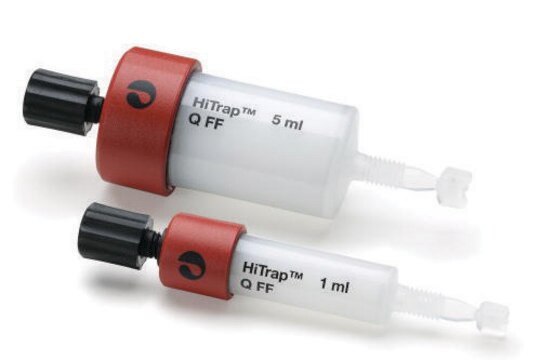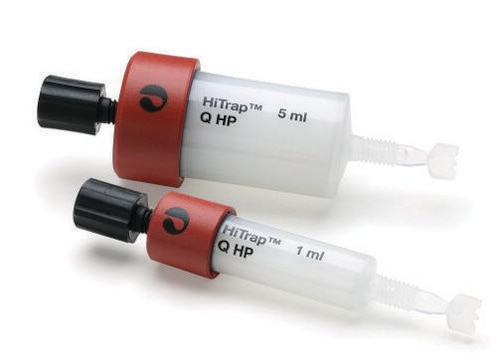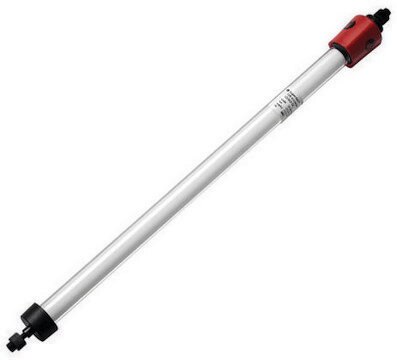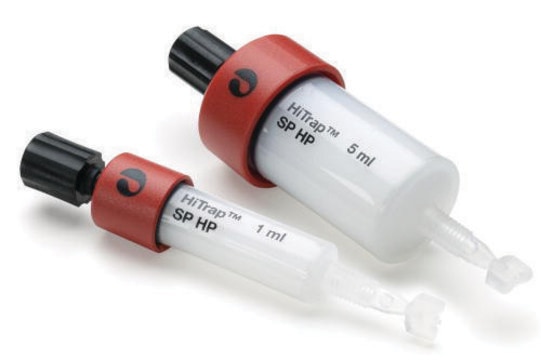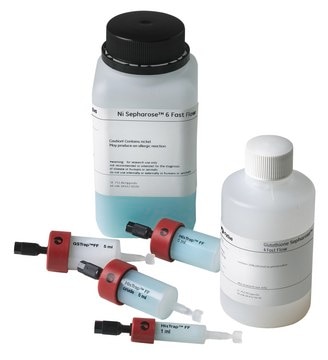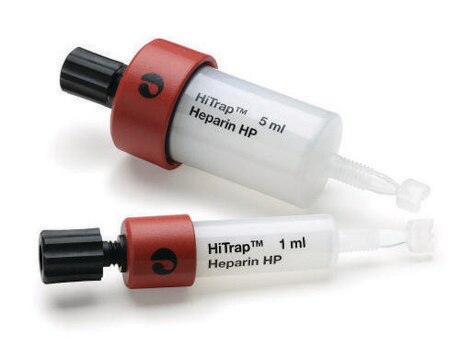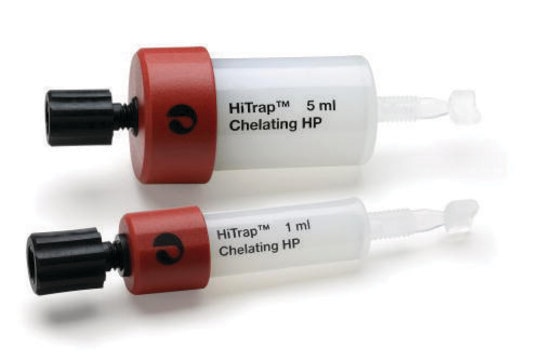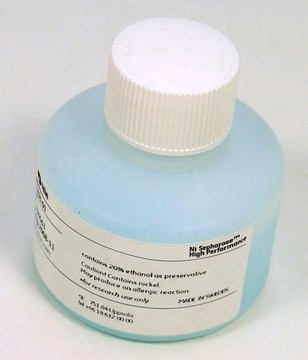GE17-5248-02
HisTrap™ High Performance
Cytiva 17-5248-02, pack of 5 × 5 mL
Synonym(s):
Nickel-charged chromatography column, HP columns, IMAC-columns, protein purification columns
About This Item
Recommended Products
shelf life
Please be aware this product may be shipped 90 days before the expiration date. For more information on the batch specific expiration date, please contact technical service.
packaging
pack of 5 × 5 mL
manufacturer/tradename
Cytiva 17-5248-02
parameter
4 ml/min (1 ml), 5 ml/min (5ml) flow rate (H2O at room temperature)
42 psi (H2O at room temperature.)
bed size
16 mm × 25 mm
bed volume
5 mL
column I.D.
16 mm
matrix
highly cross-linked 6% agarose
avg. part. size
34 μm
cleaning
2-14(Ni2+-stripped medium.)
working range
3-12(Ni2+-stripped medium.)
capacity
≥40 mg binding capacity (histidine-tagged protein/ml medium)(H20 at room temperature)
≥40 mg binding capacity (histidine-tagged protein/ml medium)(Protein binding capacity is protein-to-protein dependent.)
Related Categories
General description
HisTrap™ HP 1 mL and 5 mL columns are designed for simple, one-step purification of histidine-tagged proteins. The columns are prepacked with Ni Sepharose™ High Performance, which has high binding capacity and low nickel ion leakage that ensures reliable capture of target protein in repeated IMAC purifications.
HisTrap™ HP columns can also be used for the purification of tagged proteins containing shorter or longer polyhistidine tags, such as (histidine)4 or (histidine)10. The shorter (histidine)4 will bind more weakly and the longer (histidine)10 will bind more strongly compared with (histidine)6. This difference in binding strength can be used during purification; since (histidine)10 binds more strongly, a higher concentration of imidazole can be added to the lysed cells. This can facilitate the removal of contaminants that can otherwise be copurified with the tagged target protein.
The high stability and broad compatibility of Ni Sepharose™ High Performance maintains biological activity and increases product yield, at the same time as it greatly expands the range of suitable operating conditions.
For convenient scaling up of histidine-tagged protein purification, use 20 mL HisPrep™ FF 16/10 columns. Ni Sepharose™ 6 Fast Flow, the medium prepacked in HisTrap™ FF and HisPrep™ FF 16/10 columns, allows high flow rates, which facilitates scale-up of histidine-tagged protein purification.
Features and Benefits
- High binding capacity, at least 40 mg/mL chromatography medium.
- Compatible with a wide range of reducing agents, detergents, denaturants, and other additives.
- Negligible Ni2+ leakage
- Simple manual operation with a syringe, pump, or chromatography system such as AKTA design
Storage and Stability
Analysis Note
Legal Information
Signal Word
Warning
Hazard Statements
Precautionary Statements
Storage Class Code
3 - Flammable liquids
Certificates of Analysis (COA)
Search for Certificates of Analysis (COA) by entering the products Lot/Batch Number. Lot and Batch Numbers can be found on a product’s label following the words ‘Lot’ or ‘Batch’.
Already Own This Product?
Find documentation for the products that you have recently purchased in the Document Library.
Customers Also Viewed
Articles
This page shows high-throughput screening using His MultiTrap™ HP and His MultiTrap™ FF 96-well filter plates from Cytiva.
This page shows how to perform a purification and on-column refolding of an insoluble his-tagged protein from an E. coli culture with HisTrap™ FF columns and ÄKTAprime from Cytiva.
This page describes principles and standard conditions for different purification techniques of histidine-tagged proteins using Cytiva products.
Protocols
This page shows how to purify Strep-tag II recombinant proteins using StrepTrap HP 1 mL and 5 mL from Cytiva.
Ni Sepharose High Performance consists of highly cross-linked 6% agarose beads (34 µm) to which a chelating group has been immobilized and subsequently charged with Ni2+ ions.
This page shows how to purify protein A-tagged proteins using Cytiva products.
This protocol shows how to remove histidine tags by enzymatic cleavage using Cytiva products.
Our team of scientists has experience in all areas of research including Life Science, Material Science, Chemical Synthesis, Chromatography, Analytical and many others.
Contact Technical Service